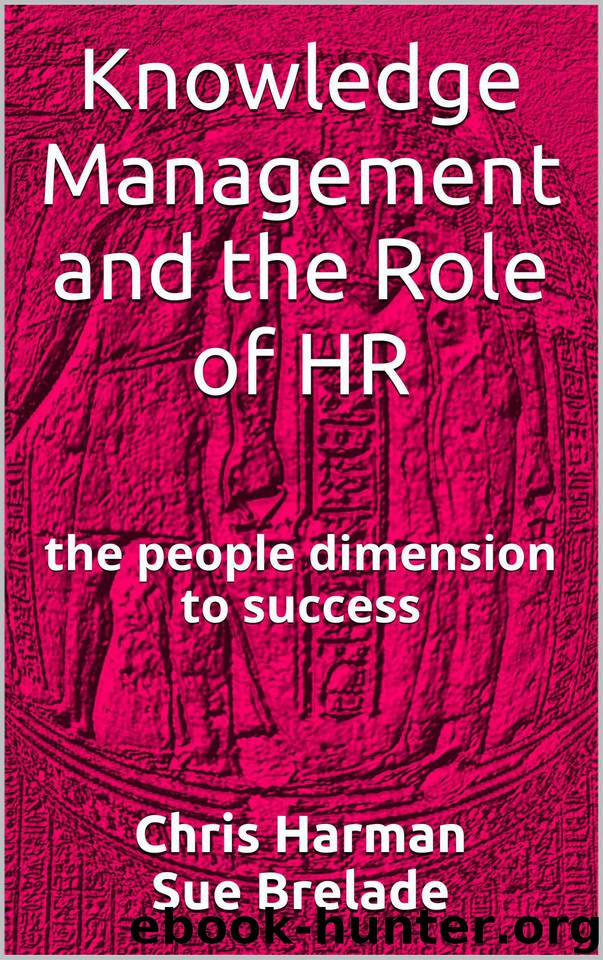Knowledge Management and the Role of HR: the people dimension to success by Brelade Sue & Harman Chris

Author:Brelade, Sue & Harman, Chris [Brelade, Sue]
Language: eng
Format: epub
Publisher: SCH Associates Ltd
Published: 2014-04-13T16:00:00+00:00
Managing to Reward
Managing people so that they feel valued and rewarded is often as difficult as introducing a new pay structure. It requires a concern for the whole person, an awareness of the impact of one’s own actions and an understanding of the motivations of others collectively and individually.
Typical problems in rewarding knowledge workers that are frequently attributed to management failures rather than systems failures include:
a) failing to individualise rewards;
b) always qualifying praise with a 'but..' (focusing on problems not achievements);
c) giving a financial reward for work done but not giving the recognition;
d) failing to recognise an important achievement but giving recognition for a less important achievement;
e) failure to demonstrate any interest or understanding of the work being done.
Overcoming these problems will require:
a) sensitivity to the needs of staff;
b) giving recognition both formally and informally;
c) valuing the contribution of individuals (both in words and actions);
d) knowing what people are doing, what problems they are facing, and demonstrating that knowledge;
e) personalising rewards;
f) actively seeking feedback on one’s own actions and their impact;
g) treating people with the same courtesy and respect irrespective of their level in the organisation;
h) recognising different motivations (and not overestimating self interest and underestimating job satisfaction and professionalism as a motivator for knowledge workers);
i) recognising that what may seem like a reward to senior managers may be perceived very differently by other staff.
The different perception of those giving rewards and those receiving rewards makes effective feedback mechanisms and consultation very important. It is therefore surprising how rarely organisations, and HR departments within organisations, check with staff the motivational value of rewards or involve those being rewarded in the design of reward systems. This process is illustrated in Fig.3.4.
M ini Case Study: The principal of a higher education institute decided that it would have a positive effect on motivation and morale if he introduced a system of inviting academic staff to join him for tea and biscuits in his office. He believed this would be a good ‘recognition’ reward for staff that had made a special contribution to the work of the college.
For several months he did this. Each week he asked his departmental heads to suggest some names with a note of what they had done. He would then pick two names and ask his secretary to write to the two individuals chosen, inviting them to his office. When they arrived he duly gave them tea and biscuits and engaged in general conversation about the college and their work. He found that the staff did not join in with this general conversation and seemed ill at ease. After a few months he discussed this with his senior managers. It transpired that the staff being invited to his office did not see the invitations as a reward or as a motivating event, rather they were suspicious and assumed there was a hidden agenda, despite their managers reassurances, as they did not generally see the principal from one year to the next except at formal occasions. The tea and biscuits stopped shortly afterwards much to the relief of all concerned.
Download
This site does not store any files on its server. We only index and link to content provided by other sites. Please contact the content providers to delete copyright contents if any and email us, we'll remove relevant links or contents immediately.
Bullshit Jobs by David Graeber(4179)
Radical Candor by Kim Scott(2715)
I Am Right, You Are Wrong by Edward De Bono(2441)
23:27 by H. L. Roberts(2248)
Nomadland by Jessica Bruder(2058)
Average Is Over by Tyler Cowen(1845)
The Conflict Resolution Phrase Book by Barbara Mitchell & Cornelia Gamlem(1773)
Out of Our Minds: Learning to Be Creative by Ken Robinson(1741)
High-Impact Interview Questions by Victoria A. Hoevemeyer(1691)
The Ideal Team Player by Patrick M. Lencioni(1640)
An Everyone Culture: Becoming a Deliberately Developmental Organization by Robert Kegan & Lisa Laskow Lahey(1631)
Who Moved My Cheese?: An Amazing Way to Deal With Change in Your Work and in Your Life by Johnson Spencer(1628)
The Asshole Survival Guide by Robert I. Sutton(1598)
Automatic Society by Bernard Stiegler(1548)
Unleashed by Anne Morriss & Frances Frei(1538)
Who by Street Randy & Smart Geoff(1501)
42 Rules of Employee Engagement by Susan Stamm(1475)
96 Great Interview Questions to Ask Before You Hire by Paul Falcone(1451)
Fish! by Stephen C. Lundin(1398)
